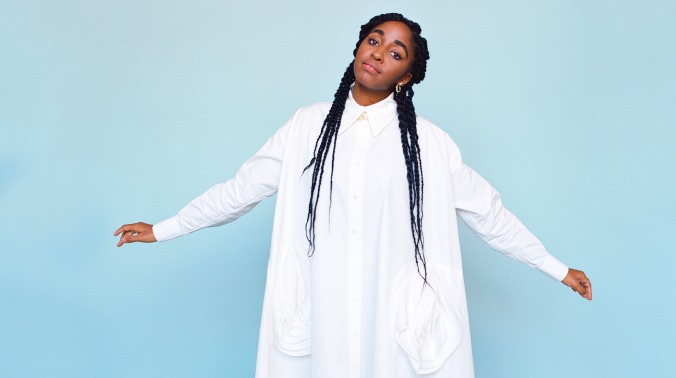Ayo Edebiri on conquering imposter syndrome to claim her spotlight in Big Mouth and Dickinson

Ayo Edebiri is having quite the moment right now with her recent debuts in not one, but two gut-busting comedies on two major streaming platforms. For Netflix’s envelope-obliterating adult animated series Big Mouth and Apple TV+’s anachronistic reimagining of Emily Dickinson’s youth in Dickinson, the Boston native gets to flex her writing and her acting chops, pulling double-duty as a series writer and a prominent supporting character in the latest seasons of both.
But calling Edebiri’s rise a “moment” implies that her time in the spotlight is fleeting when, in fact, she’s just getting started. In Dickinson, the young comedian plays Hattie, a sharp-witted maid who is a self-proclaimed freelancer with many talents (two of which include selling her own hair care products and clairvoyance) and an acute ability to steal whatever scene she occupies. Though Big Mouth fans won’t get to experience Edebiri’s skills as a scribe until season five, she’s already stepped into the drawn shoes of precocious Missy Foreman-Greenwald, a role previously held by Jenny Slate before her exit last June. But sliding into any established, beloved world isn’t all that simple, even without the added pressure of a fraught, industry-wide reckoning with systemic racism. Just before the holidays, Edebiri spoke with The A.V. Club about playing Hattie, the way Missy’s journey with race reminded her of her own, and how a Nancy Grace podcast showed her the ridiculousness of imposter syndrome.
The A.V. Club: I had to watch your episodes of Big Mouth a couple of times before realizing that you had stepped in to voice Missy; the way you managed to match Slate’s voice was impressive. You’ve mentioned workshopping that voice with the show’s creators a lot. Was there any back and forth over how you wanted Missy to sound, or were they pretty set on wanting her to maintain the voice that fans already knew?
Ayo Edebiri: When I first got the email asking if I wanted to send in a tape, I remembered some of the best voiceover advice that I’d received from a casting person: It’s okay to send more than one take. It’s actually encouraged to send a bunch of different voices and try out a bunch of things because you never know what people are going to want. So I sent in a bunch of different tapes and when we started doing the callbacks, what was so refreshing and a little bit calming was the fact that it was such a collaborative process where it was like, “Okay, try something that feels a little bit closer to Jenny’s voice and maybe then try something that’s a little bit closer to your voice, something that is maybe combining these things.” There was sort of this sliding scale that we would go back and forth on. I think where it ended up is this cool place that has some of those vocal affectations that people might know from Missy, but there are hints of my speaking voice, which is cool. But it definitely involved a back and forth process.
AVC: The news of your casting was exciting on its own, but this cool new job also happened to be taking place right at the crux of a major global conversation about systemic racism. Did that add any pressure or did it just make the victory sweeter?
AE: Oh, it 100% added a thousand more pounds of pressure and anxiety, as well as one hundred more pounds of just feeling like people’s eyes were going to be on me in a way that I was not really expecting. The imposter syndrome was going off the charts, and I was already so accustomed to sometimes questioning success. If you’re young, a woman, a person of color, marginalized in any regard, or if you’re a mix of all these things, you can sometimes be like, “What is happening to me and why?” And then all of a sudden when there are people just commenting on my Instagram, I’m like, “Why did you do this?” It’s a strange thing to get used to.
But all the writers, cast, and the crew of the show are so smart, empathetic, and supportive. Having people who I was in a writers’ room with and have been friends for years listen to the episodes and say, “I’m so happy for you. I heard this take. Good job!” was definitely very grounding and helpful during a very heated summer. I moved to L.A. the previous year and was trying to get involved in local politics, protesting with friends who are working with grassroots organizations, and trying to get involved with those, too. So it was a lot of heavy feelings mixed with this really big career joy. It was definitely a lot.
 Keep scrolling for more great stories.
Keep scrolling for more great stories.
